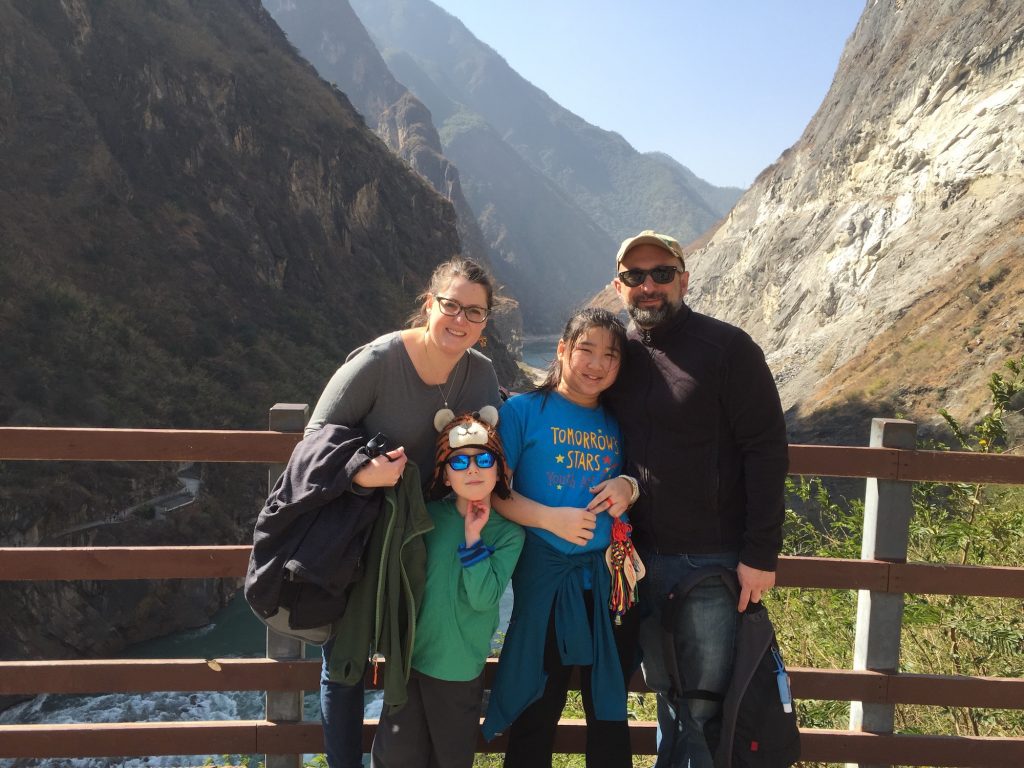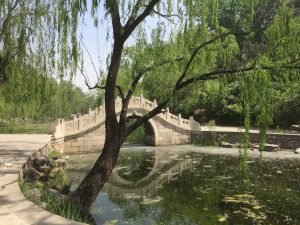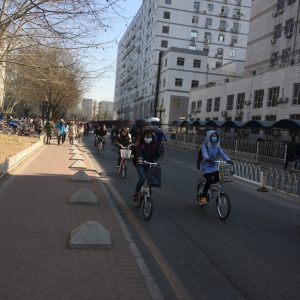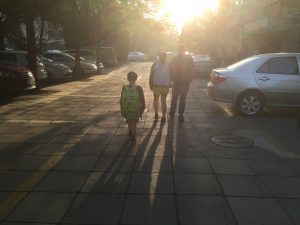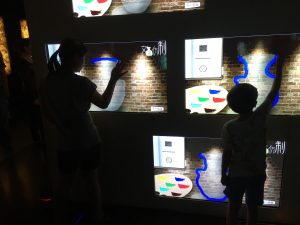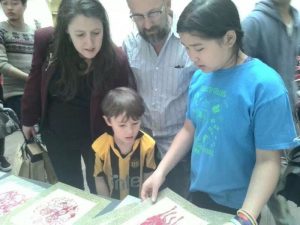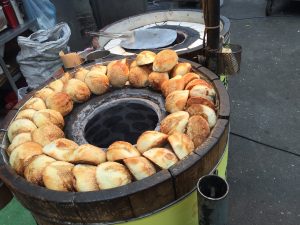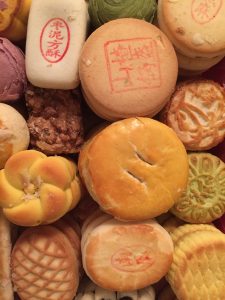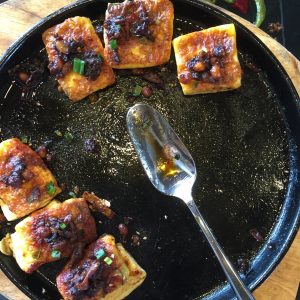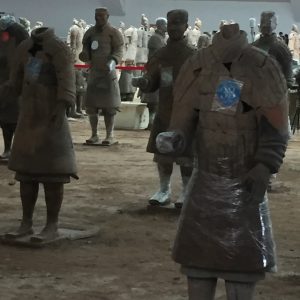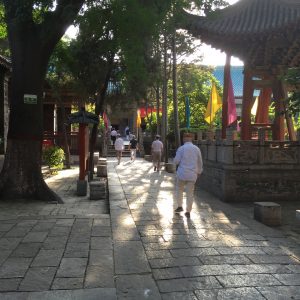Dr. Heather Shirey, Associate Professor and Director of Graduate Studies, Art History, spent the spring semester at Tsinghua University in Beijing, China. Her semester is China was made possible by support from the Fulbright-Terra Foundation Award in the History of American Art. This is the final of three blog posts from Dr. Shirey.
Dr. Shirey responds to some FAQ about her semester in China.
Wow, China. How is your Chinese? Fortunately for me, no one really expected me to speak any Chinese at all. Therefore, the bit I can speak made me a huge success. “I am an art history professor at Tsinghua University” flowed off my tongue easily because I said it so often. I had moderate success with casual conversations with other adults at the playground, although I occasionally had to call on my children to help me out. I can order food and get around an unfamiliar city with the help of a translation app. People in China are generally exceedingly patient with foreigners and very open to any attempts to communicate, no matter how feeble. I’d describe my skills as “low functional” in that I could probably go about living the rest of my life in China at the survival level, but I would struggle to develop deep social relationships that didn’t rely on English. That said, I am nearly illiterate, as I can only read a few hundred characters, if that. The day before we left, reading started to kick in—I noticed that I was suddenly able to read some street signs! But then it was time to go home. I enjoyed the daily struggles and triumphs of communicating in Chinese and I aspire to continue my studies now that I am back in Minnesota.
Where did you live? My grant provided us with housing on the campus of Tsinghua University. The campus itself is huge and there are many beautiful natural areas. The apartment we lived in was simple, and much larger than we expected—we even had office space in the apartment. It was a 5th floor walk-up so we got a lot of extra exercise! The other residents of the building block we were all Chinese and we normally did not encounter other foreigners in our neighborhood. We had a lovely fruit and vegetable market nearby, making life very convenient. It was about a 15-minute walk to the nearest subway station, so although we were sheltered by the tranquility of campus, we were also well connected to the rest of Beijing.
- Tsinghua campus in spring
- “rush hour” on the Tsinghua campus
- Daily walk to the school bus
How did your kids like China? Our children, ages 6 and 11, enrolled in an international school where English was the primary language of instruction. They made friends from all over the world, and I think they really got the travel bug as a result. Now they are always planning trips to Malaysia, India, Micronesia, and Poland, and I know this is because of the great bonds they formed with kids from these places. Prior to the trip, my daughter spoke some Chinese as a result of having previously attended a Chinese immersion school. Her Chinese really kicked in when it came to day-to-day transactions. She loves to shop and she really mastered bargaining. She usually paid a quarter of the starting price of any given item at a market. My son was something of an international superstar. He has cute curly hair and big round eyes, and I think he looks something like an anime character come to life. Everyone wanted to take a selfie with him, much to his chagrin. He did not speak any Chinese when we arrived, but he got to be quite competent in 5 months. He really wants to keep learning now that we are home.
- Visiting the Ming Tombs in Nanjing
- Exploring the Nanjing Museum
- Examining traditional Chinese paper arts
What about the food? Since we lived in an apartment, we usually cooked at home. We had access to great produce at the local market. There was also a lovely stand with hand-made noodles just around the corner. There are markets that specialize in imported groceries all over Beijing. Food safety is actually a major concern for people in China, so there were some things, like milk, that we always bought imported. There are many great restaurants specializing in Western food in Beijing. We often ate Indian food and pizza. Interestingly, it took a trip to China for my kids to fall in love with the Caesar salad—who knew, but Pizza Hut in China has a fantastic Ceasar salad! As for Chinese food, our entire family absolutely loves hot pot. This is like a Chinese version of fondue, take away the cheese. Meat and vegetables are cooked in a delicious pot of boiling broth, accompanied by an amazing array of sauce options. Another favorite was dim sum in Guangdong Province and in Hong Kong. And street food in the Muslim Quarter in Xi’an. And Jianbing, a kind of savory Chinese pancake sold by street vendors. Ok, street food anywhere. And dumplings, dumplings everywhere and of every variety.
- favorite local foods
Given your busy teaching schedule, did you have a chance to travel? Yes! We actually visited 15 cities during the spring semester. Much of this travel involved university visits as part of the Guest Lecture Program (see previous blog post). However, we also did some travel just for fun. Before the trip I asked Elizabeth Kindall for her travel suggestions, and this led us to some cities that were not part of our formal lecture program. The Master of Nets Garden in Suzhou lived up to Elizabeth’s rave reviews, and the Chengdu Panda Base delivered a high dose of cuteness. I teach the terracotta warriors from Xi’an in class, so seeing the open pits and ongoing work of archaeologists was amazing. Some of the best moments while traveling are completely unplanned. Also in Xi’an, we just happened to visit the mosque at the time of the calling to prayer on the last day of Ramadan. What an incredible moment. Just for fun, we went to Tokyo and visited the fish market and an amazing Buddhist temple. My favorite trip was to Taipei—such a green and beautiful city and amazing food!
- panda in Chengdu
- Site of the ancient terracottas near Xi’an
- Mosque in Xi’an
